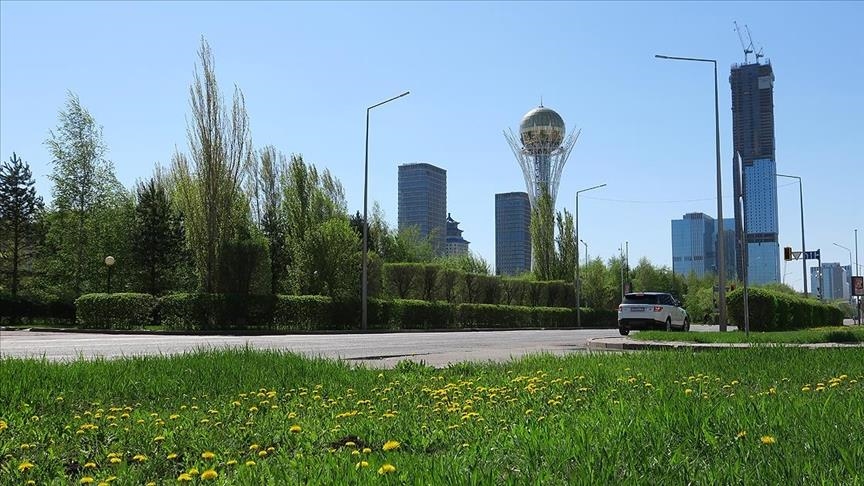ANALYSIS: Geopolitical situation leads Kazakhstan to diversify energy routes
Disruption in transporting oil to Black Sea via Caspian Pipeline Consortium has led Kazakhstan to explore reliable options

*The writer is a UK-based analyst and has worked with universities in three Central Asian countries.
LONDON
The current geopolitical situation exacerbated by the Ukraine war and sanctions imposed on Russia has led the energy-rich Central Asian country of Kazakhstan to find alternate routes to transport its gas and oil to global markets.
Kazakhstan exports 80% of its oil through the Caspian Pipeline Consortium (CPC) and hence it needs to diversify its transportation options to emerge as an autonomous and alternate energy hub for the Asian continent.
In a phone conversation with European Council President Charles Michel, Kazakhstan's President Kassym-Jomart Tokayev on July 4 expressed concern about the risks to global energy security and conveyed his country's readiness to help stabilize the situation in the world and European markets. Tokayev also called on the European Union to cooperate in developing alternate transcontinental corridors, including the Trans-Caspian International Transport Route (TITR), also known as the Middle Corridor.
It is a multilateral network linking China and the European Union through the economies of Central Asia, the Caucasus, Türkiye, and Eastern Europe.
As the CPC activities that transport Kazakhstan’s oil to Black Sea ports via the Russian territories risk possible suspensions, Tokayev instructed Kazakhstan National Trading and Transporting Oil Company known as KazMunaiGas to work out the best options for using the TITR to diversify supplies of Kazakh oil. The CPC is pursuing measures to eliminate glitches that hinder the smooth operation of the oil pipeline by early 2023.
According to Kazakh energy expert Asylbek Zhakiev, as most of Kazakhstan’s oil exports currently pass through one pipeline to the Russian port of Novorossiysk on the Black Sea, there is a need for a range of alternative options which may offer optimal value since exports to China can rise further.
Economic security
Given the risk posed to Kazakhstan’s economic security, it has become necessary to review the contract with Russia and divert at least 10 million tons of oil toward China, says energy economist Almas Chukin. For exporting Kazakh oil unrestrictedly, Chukin has proposed a few options that involved bypassing Novorossiysk.
“One option is using the Atasu-Alashankou pipeline going towards China. It currently transports 12 million tons per year, of which 10 million tons of oil is Russian,” he said.
Sources at Kazakhstan Energy Ministry have indicated that several other alternative routes are being worked out as part of the further diversification of oil exports. One is to upload oil supplies on ships from the Caspian port at Mangistau and Atyrau then transport them to the port of Baku (Azerbaijan). From Azerbaijan, the supplies can go through Baku-Tbilisi-Ceyhan (BTC) pipeline and also via the Batumi (Georgia) and Neka (Iran) ports.
Chukin argues that there is a possibility to use Kazakhstan railways for transporting oil directly to China rather than using Russian territories. Arrangements can be made for transporting oil by rail to the refineries in Uzbekistan and Kyrgyzstan.
Additionally, Chukin believed there were two more comprehensive solutions.
“We have three ports in the Caspian - Aktau, Kuryk, and Shevchenko - to allow load energy supplies for transportation to Baku. The pipeline to Türkiye is operating at 50% capacity and hence can still take up to 20 million tons. But it will be necessary to expand the storage capacities in Baku as well,” he said.
Further, he said that Kazakhstan can also approach the US and seek exceptions to avoid sanctions on the construction of the Kazakhstan-Turkmenistan-Iran pipeline to the Persian Gulf or through Türkiye to the sea.
In the context of finding substitute markets, Kazakh economist Almaz Abildaev believes that there is a strong case to expand supplies in the direction of China and to take a range of measures to upgrade and expand Kazakhstan's logistic infrastructure for future needs. He, therefore, expressed the need to extend and improve linkages to Alashnkou pipeline situated along the border with China.
Extension of pipeline
He said that extending the pipelines toward potential future Asian markets is long overdue.
“Oil supplies which are not required by China could still be transported onward to China’s eastern coasts to storage terminals which may be leased or jointly built for future transportation to Vietnam, South Korea, and other markets in Asia,” he said.
To diversify means to ensure uninterrupted oil supplies to its clients, Kazakh President Tokayev has tasked the authorities at Kazakhstan Railways to develop the country’s logistics and transport development network. Such measures are aimed to ensure secure sustained and smooth supplies of oil. These include finding alternates to diversify the transportation options.
Top priority will be given to advancing TITR and upgrading the highways linking major population and production centers in the West including Aktube, Atyrau, Aktubinsk, with the cities in the East such as Almaty, Karaganda, Taldy Kurgan, and Ust Kamengorsk.
According to Bekzhan Sadykov from Kazakhstan Strategic Studies Institute, the transport corridors are expected to create favorable conditions for business in the future and accelerate economic activity for the population living along the length of those routes.
They will help create new jobs and enable farmers, manufacturers, and traders to generate income to spur economic growth, and above all will transport the country's main products to global markets.
**Opinions expressed in this article are the author's own and do not necessarily reflect the editorial policy of Anadolu Agency.








